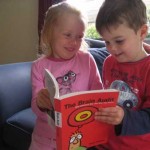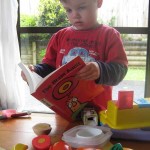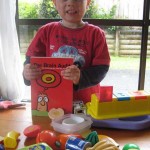Here are a few more entries for The Brain Audit Book from around the world

Much luck (to you and Sean… and me!)
Alex Kuzelicki, Australia
———-

If you haven’t made the Butter Chicken the recipe is on Page 113. And Yes! Sean can cook too!! Yummy stuff.

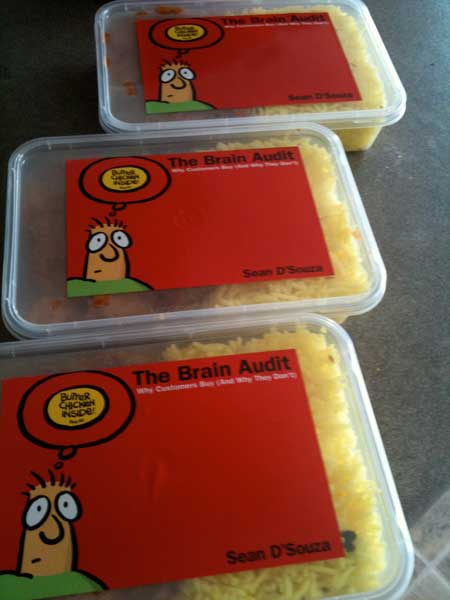
This is the butter chicken on its way to TVNZ- New Zealand. A small thank you for asking Sean on The Breakfast Show. And yes, if you are wondering the rest of the butter chicken was eaten by Renuka 🙂
The page again 113.
Renuka Menon, Psychotactics Office, Auckland, New Zealand
———-
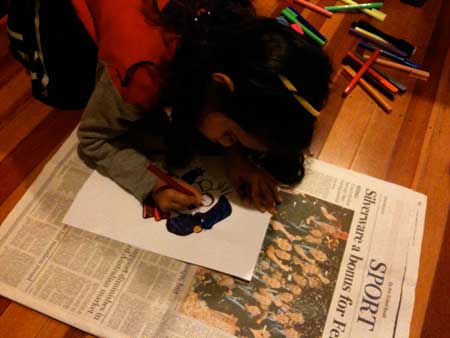
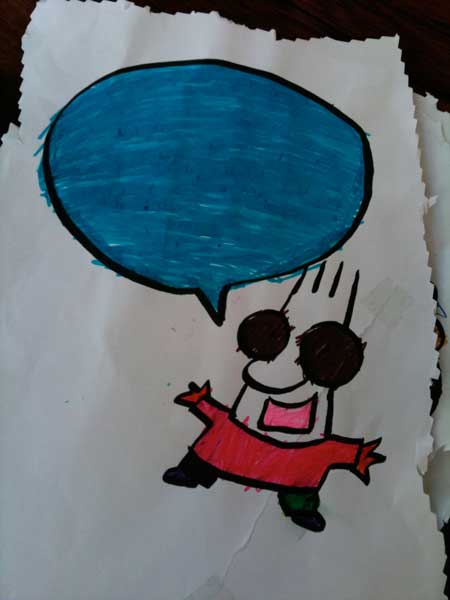
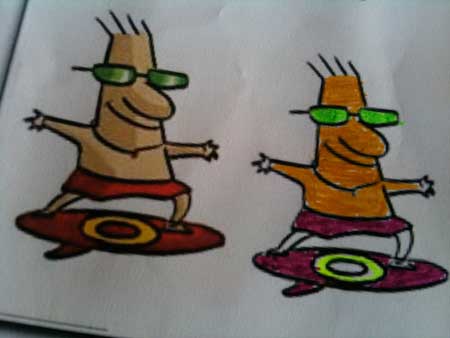


Marsha colouring Cuatro
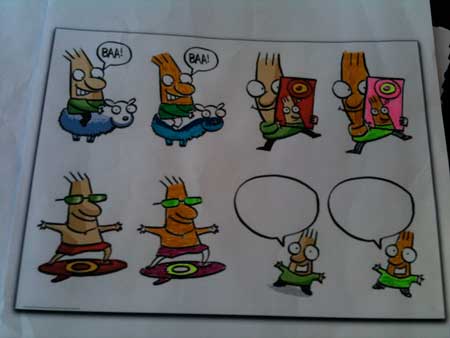
Marsha D’Souza, All of 5 years old, Auckland, New Zealand
(Marsha and Sean are best friends)
———-
>>Click to see the other Brain Audit Book Photos
And the photos keep coming in for The Brain Audit competition. Today’s photos are from New Zealand and all the way from the Arctic Circle.
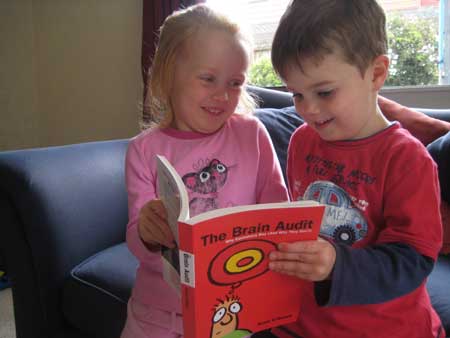
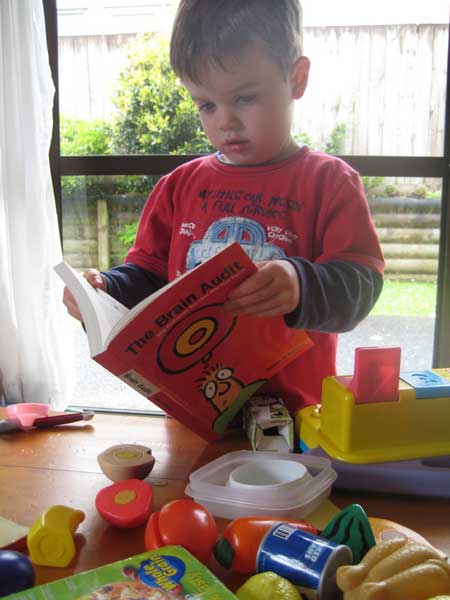
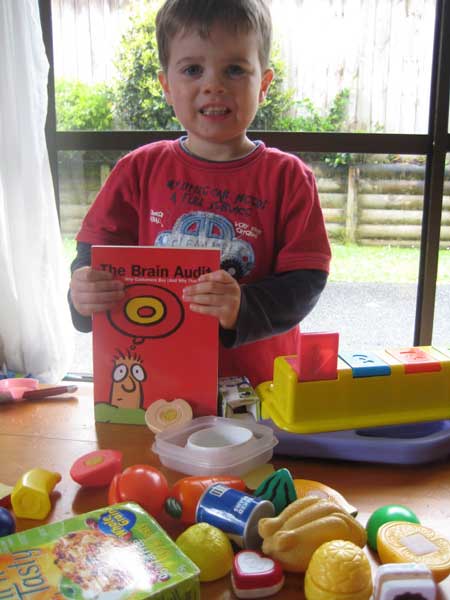
It’s child’s play..
Martin Thompson, Auckland, New Zealand
——————
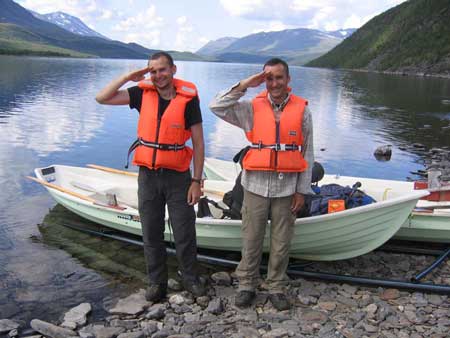
I am sending the photo of The Brain Audit book, which travelled with me and a couple of friends 150 km north of the Arctic Circle. We had to carry all our food for 10 days on our backs, but I couldn’t resist packing the book as well. There is something very weird (in the nicest way) about reading about marketing when you don’t see a living soul for days.
All the best from Europe.
Ondrej Ilincev, Prague, Europe
PS: I am the one on the right.
PPS: I thought there would be more snow as well, but we were very lucky with the weather and it was 20-25 degrees Celsius.
——————
>>Click to see the other Brain Audit Book Photos
Here are a few photos from New Zealand
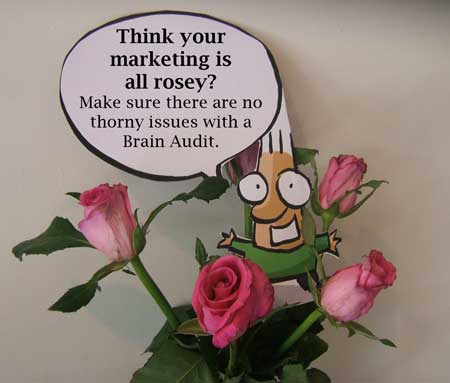
And another one from Cornelia
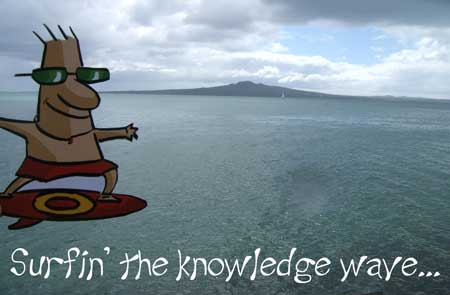
And the last one…

PS. I had a lot of fun cutting, gluing etc. 🙂
Cornelia Luethi, Auckland, New Zealand
———————-

Thought I had better not disclose where you go for coffee or you will both be inundated with fans J
Steve Munford, Auckland, New Zealand
———————-
Next Step: Send in your entries with Cuatro. The deadline is approaching.
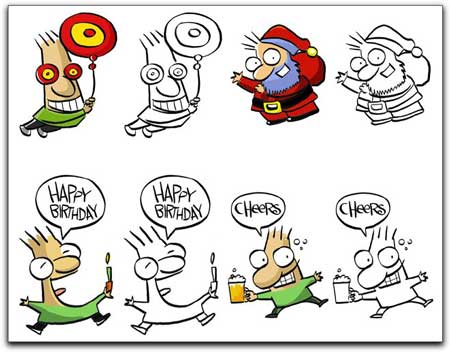
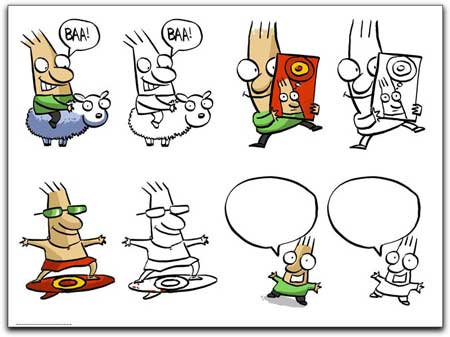
You can download the images of Cuatro here.
>>Click to see the other Brain Audit Book Photos
———————-

What’s talent got to do with insulation? (Photo Courtesy: Businessweek.com)
So are we born with talent? Or is there a code?
Of course there’s a code. And that code is embedded not in what you learn, but how that learning is insulated?
Huh?
Think of it as a pipe filled with water. Which one will allow the water to get through faster? A pipe filled with holes? A pipe that allows leaks? Or the pipe that’s well insulated?: A pipe that allows almost no waste.
We’re talking about myelin. It’s an insulator for your learning. The more you learn, the more the myelin wraps insulation around that learning, so that you get faster, and faster, and faster. But not just faster, but every freakin’ pipe in your brain gets faster. Imagine having squillions of pipes pumping water—and with little or no waste.
This is what so-called “talented” people do. Their pipes have little or no waste.
They have developed thousands of pipes that pour thousands of gallons of water at a single moment. So when you look at headline and I look at a headline, we’re not looking with the same brain. I’m looking at the headline with thousands of gallons of water pouring into what I’m looking at. You on the other hand are just looking at a headline. Which is why I can tell you how what’s wrong with a headline a mile off. And you can’t.
It’s not because I was born with superpowers to read and de-construct headlines.
Rather it’s that I’ve learned. Just as you can learn.
And what’s more it’s teachable.
And you can do what every untalented person does: Make excuses.
Or you could start working on your myelin today.
The insulator that hates waste. 🙂
And see this video too.
http://www.youtube.com/watch?v=RPACS8ogqus
P.S. If you’re interested in headlines, then these videos may help too.
http://www.youtube.com/user/psychotactics


You’ll often find people who say they don’t learn well via audio.
That they need to read a transcript instead to understand something better.
That’s the silliest thing I’ve ever heard.
And there are three reasons why.
1) The way in which we process audio separate from reading.
2) The way in which we ‘sit down’ to listen to audio.
3) So-called ‘audio learners’ find reading as well as audio just as easy.
The way in which we process audio separate from reading.
Till very recently there was this crazy myth that we somehow mishmashed the data and stored it in our brain, no matter if it was audio, or video, or text. That information was information, and it just got stored in one area of our brain. Modern research (because of better measurement tools) have shown that different areas of the brain light up when we listen to the exact words in audio, and another part of the brain lights up when we process video. And then quite another when we process text.
The brain actually creates ‘brain maps’ that make richer connections when it can process greater depth and range. So instead of one source of information, the brain accesses many sources almost simultaneously. And those that stubbornly stick their ‘I’m a reader’ not a listener, are just losing out for their stubborness factor.
But how do we know they’re being stubborn?
Because we know how damaged brains work. So in autistic children for instance, the brain does learn better via audio than learning. But most of us don’t have damaged brains. We have biased brains. This means we’re not willing to push our brains outside our comfort zone, and hence the brain will do what you get it to do.
The more you avoid audio, the more your brain favours text. It indeed makes you faster at processing text, but gives the text a single dimension. So that which you gain in processing power and speed, you lose in dimension and depth.
Which takes us to the second point: The way in which we ‘sit down’ to listen to audio—and is flawed from the core!
The way in which we ‘sit down’ to listen to audio is exactly the way we read
When was the last time you went for a walk or dusted furniture while reading? You’ve been trained since you were a child to sit in one place and read. So like an obedient 40-year old you sit in one place and listen to audio.
Well, guess what?
Audio is not a medium that is kind to listeners who sit in one place. The brain is able to process words in speech faster than on paper. So when it has to sit in one place and do nothing else, it gets ‘bored.’ You feel sleepy, restless and of course, you sincerely believe audio-learning is not for you.
Audio learning requires movement and action. That’s why we get bored and tired after listening to speakers (even good ones) drone on for two-three hours. The best speakers know the way audio is processed, and hence get you to do stuff, or take breaks. Or whatever.
But I digress.
Because the third point is coming up quickly.
Have you noticed that audio-learners aren’t quite as stubborn?
They’ll happily read a book. Or a document. They don’t need you to take your book and turn it into an audio file. They may prefer audio (because they’ve worked out what we’ve discussed in Point 2), but they have no overwhelming desire to get everything in audio.
Compare this with ‘readers’ and you’ll see a marked difference. ‘Readers’ are militant about transcripts. They’re militant about books. They don’t want to go near audio if they can help it.Yet they have conversations and listen to the radio without any problem. When was the last time they wrote to their radio station or tv station asking for transcripts?
This is why I’m calling ‘readers’ stubborn.
They are so comfortable with speed, that they miss out on true learning.
The point I’m making is that you’re equally capable of learning via audio as text.
And it’s not going to be easy to get outside that comfort zone. Because your brain will resist the move.
So do me a favour. Read that book anyway. Turn your Kindle on, anyway.
But also strap on that iPod and go for a walk and listen to the very same information in audio. It will do your biased brain as well as your stubbornness a whole lot of good. And keep you both mentally and physically fit!















